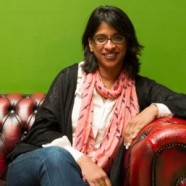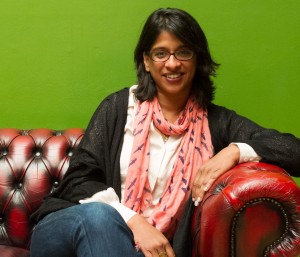Indhu Rubasingham, Tricycle Theatre
Fresh from a clutch of awards, a West End transfer for Handbagged and announcing record audience figures, Indhu Rubasingham, Artistic Director of the Tricycle theatre, is keen to talk diversity and doesn’t grab for positive pronouncements when I ask her how the last couple of years have been at the helm of the Kilburn venue.
IR: It’s nothing like I expected. It’s one of things that if you really knew what it was like – like childbirth – you wouldn’t do it. It’s been completely surprising, completely exhausting, exhilarating…a whole mixed bag. It’s pushed me and taught me a lot.
The most personally challenging thing has been learning to be tougher, to stand by my instincts and keep going. The hardest thing is the financial situation – how do you make work without compromise? And it’s to make sure I take risks no matter how scary, balanced out with careful thinking of course, but if you don’t keep taking risks or scaring yourself then you’re playing safe.
“If you’re a person of colour with any kind of ability, you’re immediately pounced upon to be representative, to be political, to be a spokesperson in a way that your fellow white artists are not.”
She’s delighted when I tell her that I’m not going to ask her what it’s like to be a British Asian female artistic director, but she has plenty to say about the diversity debate and the expectations put on her as a person of colour in a position of influence.
IR: You’re never going to please everyone, so I don’t really engage with expectations put on me, only the ones I put on myself. What really drove me right from the start of my career was seeing people like me in stories, or in an examination of the British identity. As I’ve gotten older what’s driven me is different stories, unusual stories, a different perspective, having to stand in someone else’s shoes. And also that those stories have a validity to be part of the main stage. I’m deeply political, but it’s personal – the minute I’m driven by an outside political argument, then it’s not an artistic voice.
If you’re a person of colour with any kind of ability, you’re immediately pounced upon to be representative, to be political, to be a spokesperson in a way that your fellow white artists are not. My politics are that I stand side by side but equally with any artist, no matter what colour or background. And that I have the same expectations and pressures as anyone else, not more or not different just because of race.
“Is theatre doing enough about diversity? No, of course it isn’t… Ultimately the fact that we still have to have the diversity debate is a sad indictment on the insidious barriers in our society.“
None of Tricycle’s programming has been purposefully focussed on BAME work, but the inherent diversity in the programming and her approach are evident, for example casting an Asian actor in Handbagged, who at one point plays an American First Lady.
IR: I want there to be varied stories in the programming. I want to always challenge a preconception or expectation of the audience, so the least likely story that I’m going to be interested in one populated by white, middle class straight men. That’s why I programmed our current show, The Colby Sisters of Pittsburgh, Pennsylvania, it’s about a very different, unusual world. Being a person of colour, I want to see that kind of variety on stage, but I hate being restricted or constrained by a label from outside.
Looking at the current debate and campaigns around lack of diversity in television – If the problem is in television, does it start in theatre? As that’s where many writers and artists start their career.
IR: Is theatre doing enough? No, of course it isn’t. I think training and opportunities for young people of different background and class is just as important as race. We’ve got real problems ahead if we’re not training and giving opportunities to young people; we’re not creating diverse voices in the industry. For me, as an AD, plus the location of the theatre, I have to take that very seriously. Where are the future artists coming from? Our young people’s programme is very geared towards removing obstacles for those who don’t naturally feel entitlement to the arts.
There are a lot of things that theatres should and could and must do and I think a lot of theatres are trying to do more, but yes of course the problem starts in theatre. Having said that, I do think the theatre landscape is richer than the film and tv landscape, purely because at least we’re not restricted by the level of financial risk that comes with in film and tv. So in that sense I think theatre is fertile – though there is more that can be done – but I don’t think that always translates to tv and film.
With a background of cuts to the arts, is this the right time to be having a diversity debate?
IR: I think what’s sad is that the debate is still being had. I remember starting out and thinking, ‘oh I’m the last generation, the debate is going to end here’, because it was always being talked about before my generation. But things didn’t change. I think now at least it’s continuing in a different way and hopefully on a larger scale. Ultimately the fact that we still have to have the debate is a sad indictment on the insidious barriers in our society.
Looking ahead to the Autumn/Winter season, Indhu points out The House That Will Not Stand, American playwright Marcus Gardley’s first British premiere, which she’ll be directing.
IR: It’s a new play by an African American playwright,set in New Orleans in the 19th Century. I’ve never read a play like it – it gives seven stonkingly brilliant parts to women of colour and it’s a big epic story. It’s not the kind of play that you see on stage in this country at all. And the Tricycle is about having an international voice; we’re in one of the most diverse communities in London and it’s a reflection of being a local theatre with an international vision.
What does she say to artists of colour?
IR: You’ve got to be top of your game, but any artist has to be, no matter what colour. Work out what you believe in – what is your voice? Not what you think you should be, but what actually what drives you – what story do you want to tell? And don’t compare yourself; the arts is a long game, you can be a one hit wonder, but how do you sustain a career? I look at someone like Mike Leigh, who never compromises his artistic vision and it’s never been easy for him. You don’t have to like him or love him, it’s about that integrity about what he believes in. It’s like Lolita (Chakrabarti) spending seven years on Red Velvet and wanting to give up all the time, because of being faced with rejection. But if you really have something to say it’s about finding out how to say it and becoming the best at doing so.








Recent Comments